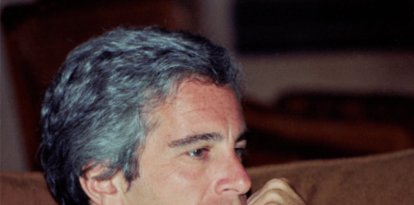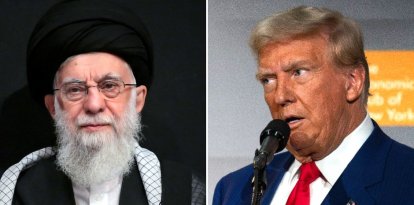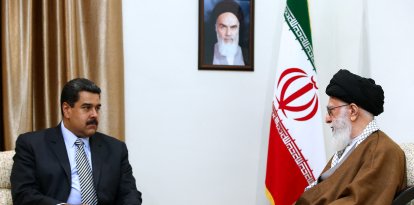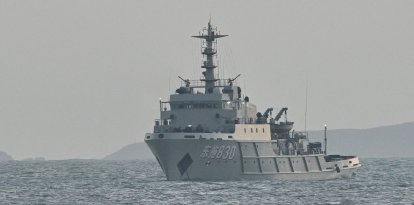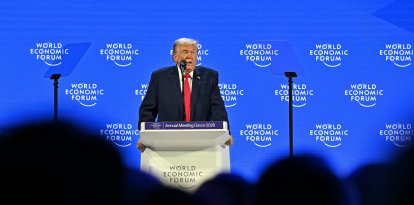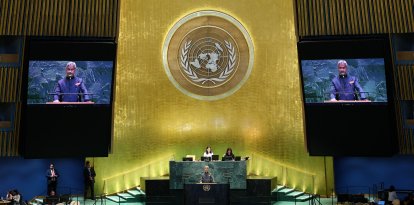Trump, Petro and the shift in the Manifest Destiny axis
If the president fully understands the new axis of his Manifest Destiny, he could achieve greatness. Perhaps, in time, we'll see a President Vance or Rubio, who, with more allies and a fresh perspective, will continue the path set by Trump in the short term.

Donald Trump boards Air Force One
Trump and Petro, presidents of the United States and Colombia respectively, starred in a electrifying diplomatic exchange this weekend that is far from being resolved. As promised in his campaign, the U.S. president got down to work on his policy of deporting the millions of illegal immigrants who are one of the biggest concerns of its citizens. Trump has begun to send flights of undocumented immigrants to their countries of origin, not at all unprecedented, since deportations have been carried out, with greater or lesser intensity, for decades.
The thing is that the Colombian president, in the grip of who knows what strange outbursts, first accepted the flights of some 160 deportees, and when everything was on track, he changed his mind and prevented them from landing on Colombian soil, thus unleashing a crisis that implied harsh administrative and economic sanctions from the U.S. administration that were suspended for now but that would put Colombia in check. It was then when, through the social network X, Petro posted some disjointed lines of nationalist vindication that seemed to come out of some drugged member of the old Cuban trova. But the Colombian beat his chest only for a few minutes, soon after he had to accept the Americans' conditions, in shameful capitulation, which made him look ridiculous to the rest of the world.
Gustavo Petro then proposed regionalizing the crisis by calling for an extraordinary assembly of CELAC (Community of Latin American and Caribbean States). The assembly, convened by his loyal ally, Honduran President Xiomara Castro, who currently holds the pro tempore presidency, is set for January 30. In a statement, the Colombian government emphasized that "the meeting will serve as an opportunity to address strategic regional issues, including cooperation on migration, the protection of human rights, and strengthening relations among member countries."
Petro, who seemed to have his cell phone glued to his hand all weekend, posted on his X account that he will "personally" go to Tegucigalpa and added that Colombia will soon assume the temporary presidency of CELAC, taking over from Honduras.
The region is set to heat up in the coming days, as the CELAC summit will coincide with the inaugural tour of newly appointed Secretary of State Marco Rubio to Panama, Costa Rica, El Salvador, Guatemala, and the Dominican Republic.
This controversy sheds light on Trump's statements during his inauguration speech, which invoked an old American doctrine, Manifest Destiny, that once defined the nation's role as a world leader but has since faced systematic criticism both domestically and abroad.
The United States as the nation chosen to lead the rest of the world
The U.S. president spoke bluntly of his desires to control the Panama Canal, annex Canada as the 51st state and acquire Greenland. He delivered these remarks in his signature provocative style, reminiscent of his 2016 campaign, igniting outrage among his critics, confusion among some allies, and a media frenzy over the revival of 19th-century expansionist doctrine. His vision is to expand the nation's territory and carry the American flag to new and ambitious horizons, ushering in what he envisions as a new golden age. "We will pursue our manifest destiny into the stars, launching American astronauts to plant the stars and stripes on the planet Mars," he declared.
Trump's audacity is undeniable, especially in the face of the dominant anti-colonial narrative promoted by the anti-Western and anti-capitalist axis. To invoke "Manifest Destiny" in this context is a bold move that global progressivism has struggled to digest. However, when one examines the geopolitical chessboard Trump must navigate, along with his recent executive orders, it becomes clear that he is seeking a renewed push for U.S. leadership. What is certain is that the Democratic Party’s policy of declining leadership has endangered the future of the world’s largest democracy and liberal democracies across the globe.
The doctrine of Manifest Destiny served as the moral justification for the territorial expansion of the young American nation following its independence. Through colonization, wars, and purchases, the United States not only expanded westward to the Pacific but also acquired territories like Alaska, Puerto Rico, the Philippines, Hawaii, and other possessions to meet its strategic needs for security and commercial growth.
Manifest Destiny held that the United States, by virtue of its economic, entrepreneurial, social, and military success, was the nation chosen to lead the rest of the world. The core idea of Manifest Destiny was rooted in the mindset of early European settlers, who viewed America as a land free from the evils of the Old Continent—a place where they could build a new society founded on their values.
Today, many view this doctrine as a stain on the nation’s history, often comparing it to the atrocities of National Socialism in the 20th century. Ironically, these same critics often overlook past Soviet expansionism or the current expansionist ambitions of China and Islamist movements. Few, however, have dared to frame it from Trump’s perspective—as a reflection of the pioneering spirit that once made the U.S. great. Even fewer present it as a legitimate response to the pressing need for security and the preservation of American leadership.
Nearly two centuries later, Trump appears to be pushing a new version of Manifest Destiny—one that looks not westward, but south and north. For too many decades, whether due to cowardice, lack of vision, or complicity, the U.S. has allowed the Cuban dictatorship to set the cultural and academic agenda that shaped political narratives from Mexico to the farthest reaches of the continent. This influence extended to the societies of Cuba, Venezuela, and Brazil, giving rise to what became known as the Sao Paulo Forum, a factory of ideological decay. The U.S.’ laissez-faire approach to this Latin neo-communist movement led to an uncontrolled, illegal influx of millions of people into the country, as well as its key institutions—both normative and formative.
Generals, allies and enemies
It’s hard to determine whether Trump possesses the philosophical or geopolitical depth to navigate this near-terminal situation. It’s almost certain that he lacks the patience and strategic foresight needed to craft a long-term plan capable of erasing so many decades of retrenchment and resignation. However, the truth remains: Trump, as always, is the world’s great weed-whacker—the one who does the heavy lifting, the vanguard upon whom all the arrows fall. During his first presidency, he lacked generals who understood his direction, who had the will or courage to follow his risky path, or who were aligned with his vision of Manifest Destiny. This time, perhaps, that will be different.
While Trump vociferates, outrages, and humiliates his opponents, people like Vance or Rubio are quietly refining and deepening their actions, never straying from the path set by the president. It’s possible that this new alignment will provide the president with the solid support his rhetorical outbursts require.
What is certain is that the new Trump administration seems to recognize its greatest enemy as the conglomerate of leaders and organizations that serve as the tentacles of the Sao Paulo Forum. Once a nonentity at the close of the last century, this organization has evolved into a "King Maker"—a Chavista superconsortium that has helped install dozens of presidents, organized a continent-wide network of corruption through narcotrafficking and public works, and sought alliances with the totalitarian regimes of China, Russia, and Iran. Today, it stands as a global axis of immense power.
"There is a whole world waiting for Trump to fall."
Trump stands alone in this battle against the monster. Only a handful of politicians and bureaucrats support him, none of them leaders of wealthy nations or powerful parties or organizations. Yet, he has wisely taken it upon himself to invite them all into his power struggle. He wants to demonstrate to the world that he understands the limitations of his allies—he knows with which oxen he plows—and he seeks to keep his troops close and engaged. He will need them.
Now, CELAC, along with other leftist groups and international organizations aligned with his adversaries, as well as dozens of "progressive" signatories, will rise to condemn every action taken by Trump as "imperialism." They will offer excuses to avoid addressing the needs of their own citizens, as no one wants to take in the undocumented immigrants that the U.S. seeks to deport. They will speak out on human rights, despite being the very governments that drive mass migrations due to violence, hunger, and the exportation of criminal cartels like the notorious Tren de Aragua.
What happened with Petro will be repeated with Sheinbaum, Arce, Castro, Lula, Canel, Noriega, and many others. China and Russia, which have been expanding their influence in the Arctic and throughout Central and South America for decades, will have the audacity to label him imperialist. The European Union, now diminished to global irrelevance and trapped in a dictatorial drift that disregards election results, freedom of expression, and private property, dares to question Trump's democratic principles. These days, even Denmark has had the nerve to condemn colonialism! A whole world is waiting for Trump to fall.
If the president grasps the new axis of his Manifest Destiny, he could achieve greatness. Based on the events of his first days in office, if Trump succumbs to chaos and momentary controversies again, it will be up to his generals to keep the course steady and deliver decisive victories that will cement his legacy. Perhaps in the future, we’ll see a President Vance or a President Rubio, who, with more allies and a fresh perspective, will continue the path Trump has set in the short term and build a lasting legacy. This will be challenging, as for years, his enemies have become the bullies of this vast neighborhood we call the American continent.
















